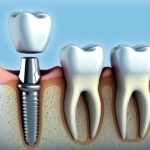Have you heard of emergency dentistry in Cambridge, ON? While it is not an area of dentistry that should intrigue or excite you, it is vital for excellent dental health. Adults and children alike need emergency dental care at one point in their lives.
What Is Emergency Dentistry?
It is an area of dentistry that caters to all the urgent and often severe dental problems. Patients need emergency dental care when they have oral problems that have progressed, worsened, or randomly occurred. No one goes looking for a dental emergency. However, if it catches up with you, you must seek emergency dental services to help preserve your dental health.
What Counts As A Dental Emergency?
The easiest way to define an oral emergency is by considering an oral problem that significantly disrupts the normal functioning of your oral cavity. Many such dental problems will manifest symptoms such as:
- Unbearable or excruciating pain
- Significant swelling that may keep spreading to other parts of your face.
- Bleeding that prolongs for more than a few minutes in a day
- A missing tooth or dental restoration
Common Types of Dental Emergencies
At Dental Art Clinics – Cambridge, we have enlisted the most common types of dental emergencies to help patients know when to see a dentist for emergency treatment. The list includes the following dental issues:
- Knocked-out tooth – it could be that your tooth is partially dislodged or has fallen from your mouth.
- Severe toothache – a toothache is more than a heightened sensitivity to temperature changes. It can make it unbearable for you to eat, sleep or be productive at work.
- Foreign object in your mouth – usually stuck in between teeth.
- Broken or missing dental restoration – could be a dental filling, dental crown, or braces.
What Happens During an Emergency Dental Visit?
When you visit an emergency dentist near you, expect the following things:
- Comprehensive dental exam – to evaluate the state of your oral cavity and make an accurate diagnosis for your treatment.
- Local anesthesia – to numb your mouth from the pain and manage your pain levels. Treatment – your dentist will treat you accordingly, depending on the results of your diagnosis.
The types of treatments in emergency dentistry differ depending on the nature of the problem and the underlying cause. Some common treatments in emergency dentistry are:
- Medication – the first solution your emergency dentist will provide entails prescribing medication. Medicine will help manage your swelling, pain and even control bleeding. Sometimes the treatment will help de-sensitize your teeth to reduce hypersensitivity. However, with medication alone, you may need long-term care after leaving the dentist’s office.
- Tooth filling – is the most common resolution for toothaches, especially when the underlying cause of the pain is a dental cavity.
- Root canal treatment – is an alternative treatment for treating a toothache. It entails treating the internal canal of your tooth, targeting the pulp cavity and root canal.
- Tooth extraction – is an incredible way to overcome your pain and inflammation is removing the problematic tooth. Usually, a dentist will opt for a tooth extraction if the damage on the tooth is too extensive to be saved through other treatment options.
- Dental restorations – if you have a damaged restoration, the dentist will either repair or replace it. It applies to any dental appliance, including dental bridges, tooth fillings, and braces.
- Surgery – surgical measures are often the last solution to dental issues. A dentist will recommend surgery to restore soft tissues in your mouth by removing excess tissue or grafting damaged tissue.
Must You Visit an Emergency Dentist?
Even though you may manage your urgent issue at home, it is crucial to visit your dentist for the following reasons:
- To treat pain – instead of suppressing pain or managing it with pain medication, emergency dentists treat the root cause of pain.
- Curb the progression and advancement of your dental issue – many dental emergencies begin as mere dental problems. The longer you forfeit treatment, the more likely your dental problem worsens. The danger is that you may incur permanent and long-term consequences.
- For speedy treatment – emergency dental units provide quick treatments with a proper understanding of the urgency of dental emergencies.






